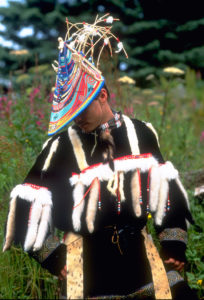
You’re in luck! In a recent post Alaska Native News – For the First People of the Last Frontier featured ‘#Two-Spirit’ in “Alutiiq Word of the Week-November 20th.” How does these words and feature figure into Canada’s discussion and recommendation from the Truth & Reconciliation Commission?
This information was supplied by the Alutiiq Museum, “the Alutiiq word for a two-spirit or transgendered man, arnauciq, translates as “a male who is sort of female.” Arnauciq sometimes accompanied hunting trips to perform women’s tasks, as women were forbidden to hunt or using hunting speech. The term for employing such a companion is arnaucirluni – to provide self with a take-along woman.”
“The Alutiiq people (pronounced /əˈluːtɪk/ in English; from Promyshlenniki Russian Алеутъ, “Aleut“; plural often “Alutiit”), also called by their ancestral name Sugpiaq (/ˈsʊɡˌbjɑːk/ or /ˈsʊɡpiˌæk/; plural often “Sugpiat”) as well as Pacific Eskimo or Pacific Yupik, are a southern coastal people of Alaska Natives. Their language is called Sugstun. It is one of Eskimo languages, belonging to theYup’ik branch of these languages. They are not to be confused with the Aleuts, who live further to the southwest, including along the Aleutian Islands,” according to Wikipedia.
***********************************************************
Editorial Note by Harlan Pruden
These Alutiiq words are examples of how the work in and for the Two-Spirit community significantly differs from than that of the broader LGBT discussions and organizing efforts.
Many non-Native LGBT activists and community organizers engaged in achieving equality often overlook or refuse to acknowledge that there was a time when people on this land who engaged in same-sex (sexual) relationships were accepted, honored and had full equality and citizenship in their respective Nations. More specifically, non-Native LGBT activists and community organizers are ‘creating’ equality or working for the expansion of ‘rights’ from a western framework. This work is based on a social justice, civil rights and/or human rights framework list a few; while on the other hand, the Two-Spirit community is working to restore and reclaim their rightful place of honor within our respective Nations. Because of the this subtle yet huge difference, Two-Spirit discussion(s) and organizing effort(s) are completely different from the dominant (non-Native) LGBT movement, for the Two-Spirit community is NOT creating anything new, but calling forth conversations and work of remembering, reclaiming and restoring this almost rich history, lived experience(s) and the many words of our Two-Spirit people like ones featured in the Alutiiq Word of the Week for November 20th.
As a result of positioning, Two-Spirit discussions and conversations and work is different for the broader LGBTQ and dominate discourse.
Take for example, at a recent community forum at an Ontario-based Canadian university that was exploring the 94 recommendations of the Canada’s Truth and Reconciliation from an Aboriginal LGBT lens. The panelists discussed how the LGBT Native community was not included in the recommendations. And, that is correct, if you are reading the 94 recommendations from a (non-Native) LGBTQ framework/lens whose overall strategy is for a stand alone acknowledgement, programs, spaces and services for LGBTQ community members. However, when than Two-Spirit is firmly rooted within an Indigenous/decolonization framework rather than a non-Native lesbian, gay, bisexual, transgender or queer framework all 94 recommendations are applicable and relevant to the Two-Spirit community.
Take for example the 14th Recommendation:
We call upon the federal government to enact an Aboriginal Languages Act that incorporates the following principles:
- Aboriginal languages are a fundamental and valued element of Canadian culture and society, and there is an urgency to preserve them.
- Aboriginal language rights are reinforced by the Treaties.
- The federal government has a responsibility to provide sufficient funds for Aboriginal-language revitalization and preservation.
- The preservation, revitalization, and strengthening of Aboriginal languages and cultures are best managed by Aboriginal people and communities.
- Funding for Aboriginal language initiatives must reflect the diversity of Aboriginal languages.
The above recommendation supports the inclusion and calling forth of terms/words like the featured in Alutiiq Word of the Week for November 20th that then supports and promotes the transmission of culture and sacred knowledges and ways most notably the Two-Spirit knowledge and teachings.